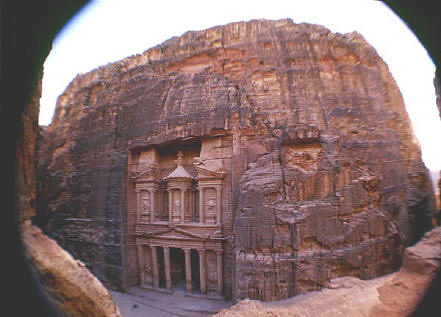|
||||||
History
Until the early 20th century, Jordan was part of Palestine, most of which is now the State of Israel. The area is home to one of the oldest civilizations in the world - archaeological finds from the west bank of the Jordan River have been dated at around 9000 BC. From 3000 BC the area was inhabited by the Canaanites and Amorites, and after them the armies of Sargon, king of Sumer and Akkad. Around 1800 BC Abraham led a group of nomads from Mesopotamia and settled in the mountains of Canaan (which roughly corresponds to present-day Israel). By 1023 BC the Israelites had formed a kingdom, led by Saul and then David, who captured Jerusalem and made it his capital. The unstoppable Roman Empire took Israel in 63 BC and placed it under the control of a series of consuls, including Herod the Great and Pontius Pilate. It was at this time that Jesus was believed to have lived and preached in the area. The increasing insanity of the Empire under Caligula prompted a series of Jewish uprisings, which lasted for years but were finally crushed when Jerusalem was razed and the province of Palestine decreed. This defeat marked the end of the Jewish state and the beginning of the Diaspora, the scattering of the Jewish people. |
|
|
In 331 AD Emperor Constantine became a Christian and gave his official stamp of approval to the previously illegal religion. Suddenly everyone wanted to know about the Holy Land, and a rash of buildings, including the churches of the Holy Sepulchre and the Nativity, sprang up all over Palestine to mark sites of religious importance. But Christianity's hold over the country was not to last long - in 638 AD Jerusalem fell to Caliph Omar and was declared a Holy City of Islam, on the grounds that the Prophet Mohammed had ascended to heaven from atop the Temple Mount. Christians around the world raised their hackles at this desecration, and by 1099 they'd scrounged a crusading army together and occupied Jerusalem, murdering everyone they could get their hands on and beginning nearly 100 years of Christian rule. But by 1187 the Muslims again had the upper hand - after decades of Christian/Muslim scuffling, the Islamic Mamluks knocked over the last Crusader stronghold in 1291.
The next 500 years were some of the quietest Palestine has seen. Empires rose and fell, and control of the country changed hands with monotonous regularity, eventually coming to rest in the hands of the Ottoman Empire. Much of desert Jordan sidestepped all this change and remained a Bedouin stronghold. When the Ottoman Empire collapsed after WWI, Britain took control of Palestine and created the state of Trans Jordan, under the rule of King Abdullah.
In 1948 Israeli Arabs and Jews went to war with one another. While everyone was distracted, Trans Jordan snapped up the West Bank and part of Jerusalem, then renamed itself Jordan. In 1953 King Hussein took the throne and Jordan entered a boom period, with a rise in tourism and plenty of aid flowing in from the USA. The Six Day War of 1967 put paid to Jordan's burgeoning tourist industry when Israel retook the West Bank and half of that huge drawcard, Jerusalem. In six days Jordan lost its money spinner and its agricultural land, and replaced them with a few thousand refugees as Palestinians streamed in from the Occupied Territories. By the 1970s, the PLO component of the refugee population was threatening King Hussein's power, and a bloody internal war began, ending when most of the radicals moved to Lebanon.
In 1994 Jordan and Israel signed a peace treaty, agreeing to drop economic barriers and cooperate on security and water. This raised concerns among Palestinians that they will be eased out of the region, as Israel and Jordan divide the spoils between themselves. At the same time, Jordan has been increasing its links with Yasser Arafat's Palestine National Authority and working toward agreements with them. In recent years Jordan has also restored relations - cut during the 1991 Gulf War - with Kuwait and Saudi Arabia. King Hussein had begun moving the country towards democracy, with the Islamic Action Front (with its links to the Muslim Brotherhood and fairly fundamentalist policies) the most successful party so far, but his death in February 1999 has left the future uncertain. The king named his eldest son, King Abdullah II, successor to the throne just weeks before dying, although the Constitution stipulates that both parents of the king must be Arab and Muslim by birth (Abdullah's mother was a British citizen who embraced Islam prior to marrying King Hussein). King Abdullah, the sort of monarch who enjoys dressing up as a taxi driver and talking with his subjects incognito, enjoys the growing support of the international community as well as most Jordanians, including the large and influential Palestinian community that appreciates his wife's Palestinian heritage. He says he will continue his father's mission to help stabalize the region, while working internally for a more democratic government, freer press and increased equality for women. |
|

